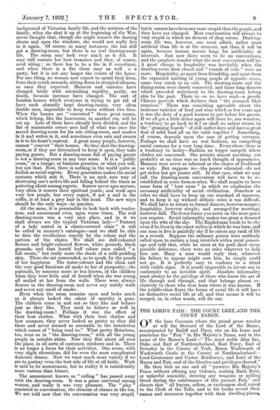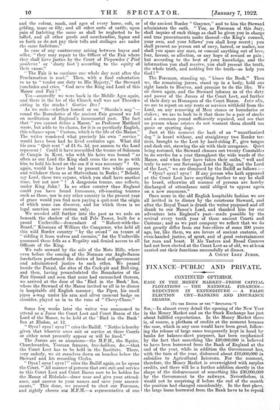THE LORD'S FAIR : THE COURT LEET AND THE COURT
BARON.
ON the bare Common where the proud geese wander at will the Steward of the Lord of the Manor, accompanied by Bailiff and Piper, sits on his horse and proclaims the " Fair " in His Majesty's Name, and in the name of the Manor's Lord—" The most noble Alan Ian, Duke and Earl of Northumberland, Earl Percy, Earl of Beverley in the County of York, Baron Warkworth of Warkworth Castle in the County of Northumberland- Lord-Lieutenant and Custos Rotulorum, and Lord of the Manor and Fair, and of the liberties and privileges thereof." He then bids us one and all " preserve His Majesty's Peace without offering any violence, making Raid, Rout, or unlawful assembly, thawing any weapons or spilling blood during the continuance of this present Fair," and directs that " all buyers, sellers, or exchangers shall repair to the Clerk of the Tolls, and in his books record their names and surnames together with their dwelling-places,, and the colour, mark, and ages of every horse, colt, or gelding, mare or filly, and all other sorts of cattle, upon pain of forfeiting the same as shall be neglected to be tolled, and all other goods and merchandise, liquor and so forth as do not pay their tolls and stallages are under the same forfeiture."
In case of any controversy arising between buyer and seller, " they may repair to the Officer of the Fair where they shall have justice by the Court of Piepowder (` Pied poudreux' or ' dusty foot ') according to the equity of their cause."
" The Fair is to continue one whole day next after the Proclamation is read." Then, with a final exhortation to us to " tender our duty to His Majesty," the Steward -;oncludes and cries, " God save the King and Lord of this Manor and Fair ! "
Yes—assuredly we were back in the Middle Ages again, and there in the lee of the Church wall was not Thersites sitting in the stocks ? Gratias Deo !
As we rode—whether horsed or on " Shanks's nag "- round the Boundaries of the ancient Fair ground we fell on meditation of England's immemorial past. The fact that " you cannot define a Manor," as Professor Maitland wrote, but adds to its charm, for it is so peculiarly English, this reliance upon " Custom, which is the life of the Manor." The writer wondered what precisely his own " service " would have been had he lived centuries ago. What did his own " Quit rent " of £4 8s. 5d. per annum to the Lord represent ? Could it have resembled the tenure of Solomon de Campis in Kent, who with his heirs was bound " as often as our Lord the King shall cross the sea to go with him to hold his head on the sea if it was necessary " ? Or, again, would he have had to present two white capons and withdraw them as at Shrivenham in Berks : Behold, my Lord, these two capons, which you shall have another time, but not now " ? A dangerous tenure, one reflects, under King John ! In no other country than England could you have found humorous, rib-roasting tenures such as these, nor in any other country in the present year of grace would you find men paying a quit-rent the origin of which none can discover, and for which there is no legal sanction save custom only.
We receded still further into the past as we rode on beneath the shadow of the tall Pele Tower, built for a proud Umfreville—clesc.endant of " Robert-with-the- Beard," Kinsman of William the Conqueror, who held all this wild Border country " by the sword " on tenure of " ridding it from wolves and enemies," for the Umfreville possessed these fells as a Regality and denied access to all Officers of the King.
We rode onward by the side of the Mote Hills, where even before the coining of the Norman our Anglo-Saxon forefathers performed the duties of local self-:government and administered justice to each other. We passed beside the Pound, the sites of the Cock-pit and Bull-ring, and then, having perambulated the Boundaries of the Fair Ground and seen that none had encroached thereon, we arrived at the door of the ' Bird in the Bush' Inn, where the Steward of the Manor invited us all in to dinner in hospitable old English manner ; the Piper, his small pipes a-wag under his arm and silver crescent badge on shoulder, played us in to the tune of " Chevy-Chase."
Some few weeks later the writer was summoned to attend as a Juror the Court Leet and Court Baron of the Lord of the Manor, to be held at the ' Bird in. the Bush' Inn at Elsdon, at 12.
" Oyez 1 oyez ! oyez ! " cries the Bailiff. " Notice is hereby given that whoever owes suit or service at these Courts or either must presently appear or will be fined." The Jurors are so numerous—the M.P.H., the Squire, Churchwarden, Yeoman farmers, free-holders, &c.—that the Court Leet has to be held in the Institute. There, very orderly, we sit ourselves down on benches below the Steward and his recording Clerks. " Oyez ! oyez ! oyez !" cries the Bailiff again, as he opens the Court. " All manner of persons that owe suit and service to this Court Leet and Court. Baron now to be holden for the Manor of Ridsdalc draw near and give your attend- ance, and answer to your names and save your anaerei- ments." Thifi done, we proceed to elect our Foreman, and rightly choose our M.F.H.—a representative of one of the ancient Border " Groynes," and to him the Steward. administers the oath. " You, as Foreman of this Jury, shall inquire of such things as shall be given you in charge and true presentments make thereof—the King's counsel, your own, and your fellows' you shall keep secret ; you shall present no person out of envy, hatred, or malice, nor shall you spare any man, or conceal anything out of love, fear, favour, or affection, or any hope of reward or gain ; but according to the best of your knowledge, and the information you shall receive, you shall present the truth, the whole truth, and nothing but the truth—so help you God I " The Foreman, standing up, " kisses the Book." Then we, the remaining jurors, stand up in a body, hold our right hands to Heaven, and promise to do the like. We sit down again, and the Steward informs us of the duty and power of the Jurors of the Court Leet, and further of their duty as Homagers of the Court Baron. Inter alio, we are to report on any rents or services withheld from the Lord, on any removing of Meer stones or boundaries or stakes ; we are to look to it that there be a pair of stocks and a common pound sufficiently repaired, and see that no person whose estates do not warrant them should use game or sporting dogs. Just at this moment the bark of an " unauthorized dog " is heard without, and straightway two Border ter- riers, brought to the Leet by hard-riding F., give tongue and dash out, strewing the air with their arrogance. Quiet being restored, the Steward chooses out twenty Constables to do service for a year throughout the wide wards of the Manor, and when they have taken their oaths, " well and truly to serve our Sovereign Lord the King, and the Lord of the Leet," we are dismissed by the Bailiff as follows :— " Oyez oyez ! oyez ! If any person who hath appeared at the Court Leet have anything further to say he shall be heard, otherwise all manner of persons are hereby discharged of attendance until obliged to appear again- on a new summons."
Once more in the old. English hospitable fashion we are all invited in to dinner by the courteous Steward, and after the Royal Toast is drunk the writer proposed and all drank to our Manor's Lord, and thanked him for our adventure into England's past—made possible by the revival every tenth year of these ancient Courts and Customs ; and as we part company we reflect that we do not greatly differ from our fore-elders of some 500 years ago, for, like them, we are lovers of ancient customs, of even-handed justice, of sport, and of good entertainment for man and beast. If Ale Tasters and Bread Conners had not been elected at the Court Leet as of old, we at least carried out their functions successfully at dinner A COURT LEET JUROR.











































 Previous page
Previous page